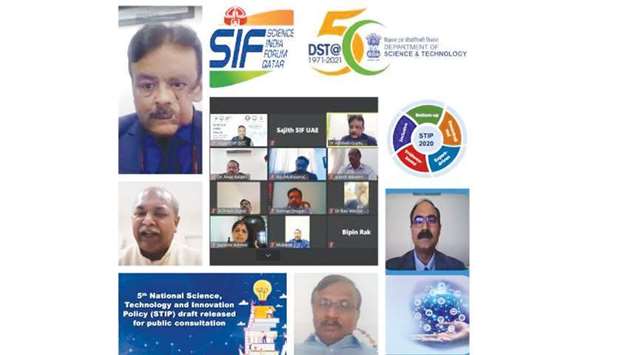Science India Forum (SIF) GCC Chapters in conjunction with Department of Science & Technology, Government of India, recently organised a virtual meeting for a detailed discussion about the second post-draft Science Technology and Innovation Policy (STIP) consultation with Indian scientific and academic diaspora from the GCC countries.
The speaker on the occasion was Dr Akhilesh Gupta, Adviser Scientist-G & Head STIP-2020 Secretariat, Department of Science and Technology, India, who deliberated on the draft of the 5th STIP. Dr Gupta in his informative and comprehensive presentation highlighted the key features of the new open science policy and said for the first time Indian diaspora are being consulted in policy formulation. STIP focuses on leveraging the internal strength of the country by making India self-reliant through science and technology interventions and at the same time proactively promoting international co-operation.
He highlighted that in the past seven years, there has been unprecedented progress in science and technology, and the new policy captures this growth and prepares India for a brighter future.
Dr Gupta further emphasised that inclusiveness was the mantra for the policy. “With around 300 rounds of consultation and nearly 43,000 participants, the consultation in the pre-draft stage of the policy formulation has perhaps been one of the largest, widest, and quickest,” he added.
Jayant Sahastrabuddhe, who presided over the session, said that the Government of India had put the entire policy draft in public domain for consultation so that people from different strata of society, who are engaged with science, technology and innovation, can put forward their suggestions before January 31, 2021. He added that the session has provided opportunity to look into the salient features of the upcoming policy and the suggestions of all stakeholders will help strengthen the policy.
The webinar was attended by 150 Indian scientific diaspora, thought leaders, academicians and distinguished community leaders from the GCC region. Attendees provided suggestions on challenges to cover the Article Processing Charge (APC) in facilitating open science policy, availability of post-doc fellowships in India, interconnectivity of state-level institutions to maintain high-quality standards, watertight compartments in definition of science, contribution of the new policy towards Industrial Revolution 4.0, registration process of innovation incubators in India and so on. The presentation is available on SIF Qatar YouTube Channel for those who missed it.

